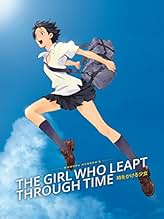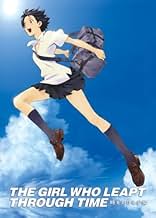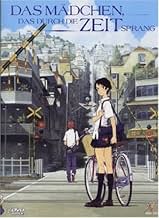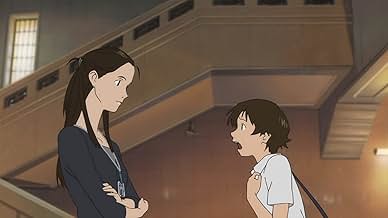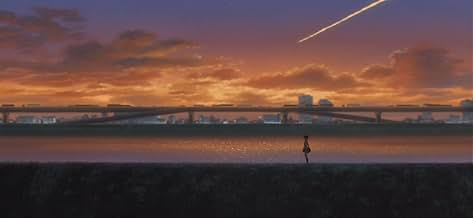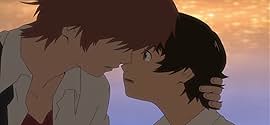AVALIAÇÃO DA IMDb
7,6/10
74 mil
SUA AVALIAÇÃO
Uma garota do ensino médio chamada Makoto adquire o poder de viajar no tempo e decide usá-lo para seus próprios benefícios pessoais.Uma garota do ensino médio chamada Makoto adquire o poder de viajar no tempo e decide usá-lo para seus próprios benefícios pessoais.Uma garota do ensino médio chamada Makoto adquire o poder de viajar no tempo e decide usá-lo para seus próprios benefícios pessoais.
- Direção
- Roteiristas
- Artistas
- Prêmios
- 12 vitórias e 2 indicações no total
Riisa Naka
- Makoto Konno
- (narração)
Takuya Ishida
- Chiaki Mamiya
- (narração)
Mitsutaka Itakura
- Kosuke Tsuda
- (narração)
Ayami Kakiuchi
- Yuri Hayakawa
- (narração)
Mitsuki Tanimura
- Kaho Fujitani
- (narração)
Yuki Sekido
- Miyuki Konno
- (narração)
Utawaka Katsura
- Makoto's Father
- (narração)
Midori Ando
- Makoto's Mother
- (narração)
Fumihiko Tachiki
- Fukushima-sensei
- (narração)
Keiko Yamamoto
- Obasan
- (narração)
Shiori Yokohari
- Moriko Uesugi
- (narração)
Sonoka Matsuoka
- Sekimi Nowake
- (narração)
Takayuki Handa
- Kato
- (narração)
Maho Kurashima
- Female Newscaster A
- (narração)
Taeko Hase
- Additional Voices
- (narração)
Keiko Aizawa
- School Nurse
- (narração)
- …
Kiyomi Tanigawa
- Home Economics Teacher
- (narração)
- …
Atsuko Yuya
- Additional Voices
- (narração)
- Direção
- Roteiristas
- Elenco e equipe completos
- Produção, bilheteria e muito mais no IMDbPro
Avaliações em destaque
"I wonder how someone was able to create such a beautiful painting, when it must have seemed that the world was coming to an end."
When high school student Makoto inadvertently discovers that she's gained the ability to leap (literally) backward through time, she immediately begins using it to her advantage - with little concern for how and why she's gained this mysterious power. No problem is too trivial to be solved by a little time travel, from pop quizzes to uncomfortable conversations. But, nothing in the past can be changed without consequence, and Makoto's frivolous use of her ability may result in one or more of her friends being lost forever.
The Girl Who Leapt Through Time is about as mainstream and accessible as anime gets. The characters are all pretty normal, likable, and relatable. There's a lot of humor in the first half of the story, while the last half is quite serious, heartfelt, and poignant. The animation and character designs are clean and smooth, and have a very modern appeal. The score has a lot of piano pieces that occasionally caught my ear in a very pleasant way.
I recommend this both to anime fans, and to those who aren't particularly familiar with eastern animation. The story is an entertaining mix of moments both somber and lighthearted, the characters are great, and the visuals were top-notch. The Girl Who Leapt Through Time isn't just a good animated movie, it's good by any standards.
When high school student Makoto inadvertently discovers that she's gained the ability to leap (literally) backward through time, she immediately begins using it to her advantage - with little concern for how and why she's gained this mysterious power. No problem is too trivial to be solved by a little time travel, from pop quizzes to uncomfortable conversations. But, nothing in the past can be changed without consequence, and Makoto's frivolous use of her ability may result in one or more of her friends being lost forever.
The Girl Who Leapt Through Time is about as mainstream and accessible as anime gets. The characters are all pretty normal, likable, and relatable. There's a lot of humor in the first half of the story, while the last half is quite serious, heartfelt, and poignant. The animation and character designs are clean and smooth, and have a very modern appeal. The score has a lot of piano pieces that occasionally caught my ear in a very pleasant way.
I recommend this both to anime fans, and to those who aren't particularly familiar with eastern animation. The story is an entertaining mix of moments both somber and lighthearted, the characters are great, and the visuals were top-notch. The Girl Who Leapt Through Time isn't just a good animated movie, it's good by any standards.
10ethSin
There are about 10 Japanese films that I re-watch almost every year since their releases. "The Girl Who Leapt Through Time" is one of only three such animated films for me.
"The Girl Who Leapt Through Time" is based on a 1967 hit novel of the same title. The original work has been used in numerous film and dorama adaptations, most famous ones being the 1983 film directed by Oobayashi Nobuhiko. Instead of making just another anime adaptation and possibly becoming just another adaptation shadowed by the 1983 film, the producers took a risk by creating a spin-off movie with the setting of about 20 years after the original story. The gamble paid off big time, as the animated film went on to win at least 23 awards worldwide.
The underlying theme in this movie was "the importance of living the moment". Our protagonist was given the power to leap back into time to correct her mistakes, only to realize later that the short-term gains only lead to greater losses that followed. The story was extremely well-constructed to teach the lesson of embracing things the way they are, and never run from confrontations, because once that moment gone, you'll never get it back.
The director for this film did a phenomenal job of pacing and creating many memorable moments, but it was the live-action film screenwriter Okudera Satoko, who really made a difference for this movie by composing a story out of number of time leaps that slowly developed the main characters and made so many epic scenes possible. Many anime screenwriters fail in movies because they incorporate too many characters, as it is common practice in series, into the limited 100 minute time-frame. What's remarkable about this piece of work is that it focuses on only three main characters. Even counting the secondary cast, there are only 8 characters in total who we are given the names of. The limited number of characters not only improved character development, it also allowed the story to focus on the underlying theme.
I was actually very uncertain about the viewing this year because I started watching a lot of TV anime again since the last viewing. However, the only new flaws I've noticed was the excessive still motion in some scenes and most backgrounds, and that the protagonist was being a bit overly insensitive in few instances, which made her character a bit unrealistic. Animation is years ahead of its time, and it still is an excellent example of what happens when music is in harmony with the story/animation. The insert song by Oku Hanako, IMO, is still the best selection ever made among hundreds of Japanese films, anime, and live-action doramas I've encountered. Ending theme is a truly poignant one that really captured the mood and made the story sink in, and the music score throughout the movie has been used perfectly to enhance the drama.
"The Girl Who Leapt Through Time" is a timeless masterpiece that made me want to cherish every moment, and it's a movie I expect myself to be re-watching for many more years to come.
"The Girl Who Leapt Through Time" is based on a 1967 hit novel of the same title. The original work has been used in numerous film and dorama adaptations, most famous ones being the 1983 film directed by Oobayashi Nobuhiko. Instead of making just another anime adaptation and possibly becoming just another adaptation shadowed by the 1983 film, the producers took a risk by creating a spin-off movie with the setting of about 20 years after the original story. The gamble paid off big time, as the animated film went on to win at least 23 awards worldwide.
The underlying theme in this movie was "the importance of living the moment". Our protagonist was given the power to leap back into time to correct her mistakes, only to realize later that the short-term gains only lead to greater losses that followed. The story was extremely well-constructed to teach the lesson of embracing things the way they are, and never run from confrontations, because once that moment gone, you'll never get it back.
The director for this film did a phenomenal job of pacing and creating many memorable moments, but it was the live-action film screenwriter Okudera Satoko, who really made a difference for this movie by composing a story out of number of time leaps that slowly developed the main characters and made so many epic scenes possible. Many anime screenwriters fail in movies because they incorporate too many characters, as it is common practice in series, into the limited 100 minute time-frame. What's remarkable about this piece of work is that it focuses on only three main characters. Even counting the secondary cast, there are only 8 characters in total who we are given the names of. The limited number of characters not only improved character development, it also allowed the story to focus on the underlying theme.
I was actually very uncertain about the viewing this year because I started watching a lot of TV anime again since the last viewing. However, the only new flaws I've noticed was the excessive still motion in some scenes and most backgrounds, and that the protagonist was being a bit overly insensitive in few instances, which made her character a bit unrealistic. Animation is years ahead of its time, and it still is an excellent example of what happens when music is in harmony with the story/animation. The insert song by Oku Hanako, IMO, is still the best selection ever made among hundreds of Japanese films, anime, and live-action doramas I've encountered. Ending theme is a truly poignant one that really captured the mood and made the story sink in, and the music score throughout the movie has been used perfectly to enhance the drama.
"The Girl Who Leapt Through Time" is a timeless masterpiece that made me want to cherish every moment, and it's a movie I expect myself to be re-watching for many more years to come.
The poster of this animated movie looks a little suggestive, but nope, it's actually a wholesome time travel movie which explores a little on the vestment of such powers to a klutzy individual, as well as relationships, and the perennial question of what would anyone do if you have the ability to go back into time, and make changes presumably for the better.
The Girl Who Leapt Through Time tells a wonderful story centered on 3 friends, the tomboyish and clumsy Makoto Konono (voiced by Riisa Naka), and two hunks Chiaki Mamiya (Takuya Ishida) and Kousuke Tsuda (Mitsutaka Itakura). Theirs is a friendship formed after school at the baseball court where they spend quality time talking about typical teenage stuff. Things start to change however, when Makoto by accident gets the power to time travel, and in her own ditzy way, uses her new found abilities for "good" - directly for herself, or in some Emma like moments, to influence the outcome of relationships for her friends and play matchmaker.
And that's just scratching the tip of the iceberg. While it's animation style is kept simple and fairly straightforward, it doesn't compromise on the complexity of its storyline. Not that it serves to confuse, rather you'll be amazed by the amount of pathos the story contains, with its various subplots especially when the time travelling stuff kicks in. It has adult sensibilities in the treatment of the plot, and knows exactly when to hit the right emotional chords when warranted.
Although based on a book, the story here serves as a quasi-sequel of sorts which takes place some 20 years later, what I can say is that the love stories intertwined has its major one being able to touch like that in Be With You. I loved that movie, and watching how this bore some similarities, you can't help but feel the same emotions coming across in the same way, nevermind that the characters here are animated, as you can feel the pain, the love, and their despair. And that is something that I should say is difficult for the genre - they're not real persons on screen - but yet being able to evoke emotions and for one to react and empathize, definitely makes it powerful, and a cut above others. Something that our local animated films had failed to do in giving us cold characters and bastardized stories from folklore.
But it's not always all the time serious in tone or mood. The movie has light hearted moments, sometimes bordering on the slapstick, no thanks to the bumbling Makoto character. In a sequence, it was reminiscent of Chinese Odyssey starring Stephen Chow, where each time travel moment gets played ad nausem with different comedic effect. Undoing blunders as we see is not exactly Makoto's forte, and while she may be using her powers in a carefree way, with great powers come great responsibilities (sorry, can't resist that one!)
As usual, anyone can find fault with the time travel paradox which rears its ugly head in any time travel movie, but I would suggest that you park those thoughts aside, and enjoy the story that the Girl Who Leapt Through Time is telling. There are slight attempts at addressing it with its creation of totally new and different realities with each jump, but even then a major paradoxical flaw still exists. At its lowest denominator, the film reminds to seize the day like it's your last, do what's right, and don't be shy in telling someone how you feel about them.
The Best Animated Film of the recent Awards of the Japanese Academy, this film gets my vote of support too with its superbly emotional and touching tale, and with its similarities to that aspect of the film which I like to Be With You, it will be no surprise if this movie finds its way to my Top Ten of the year. Highly recommended!
The Girl Who Leapt Through Time tells a wonderful story centered on 3 friends, the tomboyish and clumsy Makoto Konono (voiced by Riisa Naka), and two hunks Chiaki Mamiya (Takuya Ishida) and Kousuke Tsuda (Mitsutaka Itakura). Theirs is a friendship formed after school at the baseball court where they spend quality time talking about typical teenage stuff. Things start to change however, when Makoto by accident gets the power to time travel, and in her own ditzy way, uses her new found abilities for "good" - directly for herself, or in some Emma like moments, to influence the outcome of relationships for her friends and play matchmaker.
And that's just scratching the tip of the iceberg. While it's animation style is kept simple and fairly straightforward, it doesn't compromise on the complexity of its storyline. Not that it serves to confuse, rather you'll be amazed by the amount of pathos the story contains, with its various subplots especially when the time travelling stuff kicks in. It has adult sensibilities in the treatment of the plot, and knows exactly when to hit the right emotional chords when warranted.
Although based on a book, the story here serves as a quasi-sequel of sorts which takes place some 20 years later, what I can say is that the love stories intertwined has its major one being able to touch like that in Be With You. I loved that movie, and watching how this bore some similarities, you can't help but feel the same emotions coming across in the same way, nevermind that the characters here are animated, as you can feel the pain, the love, and their despair. And that is something that I should say is difficult for the genre - they're not real persons on screen - but yet being able to evoke emotions and for one to react and empathize, definitely makes it powerful, and a cut above others. Something that our local animated films had failed to do in giving us cold characters and bastardized stories from folklore.
But it's not always all the time serious in tone or mood. The movie has light hearted moments, sometimes bordering on the slapstick, no thanks to the bumbling Makoto character. In a sequence, it was reminiscent of Chinese Odyssey starring Stephen Chow, where each time travel moment gets played ad nausem with different comedic effect. Undoing blunders as we see is not exactly Makoto's forte, and while she may be using her powers in a carefree way, with great powers come great responsibilities (sorry, can't resist that one!)
As usual, anyone can find fault with the time travel paradox which rears its ugly head in any time travel movie, but I would suggest that you park those thoughts aside, and enjoy the story that the Girl Who Leapt Through Time is telling. There are slight attempts at addressing it with its creation of totally new and different realities with each jump, but even then a major paradoxical flaw still exists. At its lowest denominator, the film reminds to seize the day like it's your last, do what's right, and don't be shy in telling someone how you feel about them.
The Best Animated Film of the recent Awards of the Japanese Academy, this film gets my vote of support too with its superbly emotional and touching tale, and with its similarities to that aspect of the film which I like to Be With You, it will be no surprise if this movie finds its way to my Top Ten of the year. Highly recommended!
Rarely do I buy a film on DVD without having either read up about it or seen it first. The Girl Who Leapt Through Time was the first exception for me. For a dull anecdote, I walked through the store, saw it, and bought it, without knowing anything other than what was written on the back. When i got home, I didn't even start to watch it! But waited until after dinner to watch it, and to cut the already long story short, watching this movie was an experience! From the very first scenes I was grabbed. The artwork, I must say I adore, the scenery is beautiful. As for the storyline, sure, we've had time-travelling stories before, but there's never been one which after seeing it, made me want to watch it again (Seriously, as soon as it was over, I watched it again!) Cutting the even-longer story short again, I highly recommend this film, even those who are not lovers of anime might find themselves enjoying this film. Watching this movie was like an experience for me, and as odd as it may sound, I felt really warm inside after watching this. 9/10.
10oncex
This film is one of those films that comes once in every generation. The voice actors give the characters a sense of realness that makes you suffer or feel joy. The detail of the work is phenomenal and the story doesn't drag or end in a familiar way. I specially like the detail they put to little things as the sliding doors bouncing back open when Makoto tries to close them. This is one of those films that in the end it leaves you a good feeling and not guilty for spending two hours enjoying yourself. When you see this film you might have to find time to think when was the last time you saw something so good.I just wish there's a sequel for it, because I just couldn't get enough of it. But maybe is one of those stories that you wish it never ended but you know that it has to end.
P.S. Now I have to buy the DVD.
P.S. Now I have to buy the DVD.
Você sabia?
- CuriosidadesThis movie is an indirect adaptation of Yasutaka Tsutsui's novel "The Girl Who Leapt Through Time" - the main character's aunt is Yoshiyama Kazuko, the protagonist of the novel.
- Erros de gravaçãoSpoiler: During the time-stop sequence Chiaki laments that he will not be able to see the painting he has come to the past for because it is in restoration and he will not be around the next day when it is put on the wall. But Makoto knows that the picture is worked on by her aunt and so they could just go upstairs and take a look at it (they may find the door locked but the possibility is not even mentioned). Chiaki's last jump could not have erased that memory because Makoto's knowledge predates the event.
- Citações
Yuri Hayakawa: [Makoto Leaves the room, then Yuri watches the Blackboard] Makoto: Time waits for no one
- ConexõesFeatured in Glass Reflection: The Girl Who Leapt Through Time (2010)
Principais escolhas
Faça login para avaliar e ver a lista de recomendações personalizadas
Detalhes
- Data de lançamento
- País de origem
- Centrais de atendimento oficiais
- Idioma
- Também conhecido como
- The Girl Who Leapt Through Time
- Empresas de produção
- Consulte mais créditos da empresa na IMDbPro
Bilheteria
- Faturamento bruto mundial
- US$ 1.535.976
- Tempo de duração
- 1 h 38 min(98 min)
- Cor
- Mixagem de som
- Proporção
- 1.78 : 1
Contribua para esta página
Sugerir uma alteração ou adicionar conteúdo ausente


